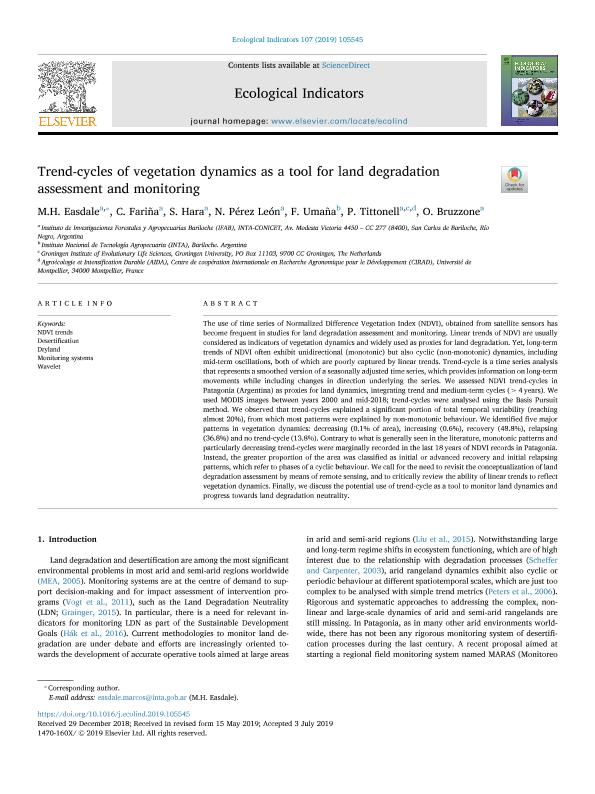Mostrar el registro sencillo del ítem
dc.contributor.author
Easdale, Marcos Horacio

dc.contributor.author
Fariña, Clara María

dc.contributor.author
Hara, Sofía María

dc.contributor.author
Pérez León, Natalia
dc.contributor.author
Umaña, Fernando Javier

dc.contributor.author
Tittonell, Pablo

dc.contributor.author
Bruzzone, Octavio Augusto

dc.date.available
2020-08-11T21:07:23Z
dc.date.issued
2019-12
dc.identifier.citation
Easdale, Marcos Horacio; Fariña, Clara María; Hara, Sofía María; Pérez León, Natalia; Umaña, Fernando Javier; et al.; Trend-cycles of vegetation dynamics as a tool for land degradation assessment and monitoring; Elsevier Science; Ecological Indicators; 107; 12-2019
dc.identifier.issn
1470-160X
dc.identifier.uri
http://hdl.handle.net/11336/111499
dc.description.abstract
The use of time series of Normalized Difference Vegetation Index (NDVI), obtained from satellite sensors has become frequent in studies for land degradation assessment and monitoring. Linear trends of NDVI are usually considered as indicators of vegetation dynamics and widely used as proxies for land degradation. Yet, long-term trends of NDVI often exhibit unidirectional (monotonic) but also cyclic (non-monotonic) dynamics, including mid-term oscillations, both of which are poorly captured by linear trends. Trend-cycle is a time series analysis that represents a smoothed version of a seasonally adjusted time series, which provides information on long-term movements while including changes in direction underlying the series. We assessed NDVI trend-cycles in Patagonia (Argentina) as proxies for land dynamics, integrating trend and medium-term cycles (>4 years). We used MODIS images between years 2000 and mid-2018; trend-cycles were analysed using the Basis Pursuit method. We observed that trend-cycles explained a significant portion of total temporal variability (reaching almost 20%), from which most patterns were explained by non-monotonic behaviour. We identified five major patterns in vegetation dynamics: decreasing (0.1% of area), increasing (0.6%), recovery (48.8%), relapsing (36.8%) and no trend-cycle (13.8%). Contrary to what is generally seen in the literature, monotonic patterns and particularly decreasing trend-cycles were marginally recorded in the last 18 years of NDVI records in Patagonia. Instead, the greater proportion of the area was classified as initial or advanced recovery and initial relapsing patterns, which refer to phases of a cyclic behaviour. We call for the need to revisit the conceptualization of land degradation assessment by means of remote sensing, and to critically review the ability of linear trends to reflect vegetation dynamics. Finally, we discuss the potential use of trend-cycle as a tool to monitor land dynamics and progress towards land degradation neutrality.
dc.format
application/pdf
dc.language.iso
eng
dc.publisher
Elsevier Science

dc.rights
info:eu-repo/semantics/openAccess
dc.rights.uri
https://creativecommons.org/licenses/by-nc-nd/2.5/ar/
dc.rights.uri
https://creativecommons.org/licenses/by-nc-nd/2.5/ar/
dc.subject
NDVI TRENDS
dc.subject
DESERTIFICATION
dc.subject
DRYLAND
dc.subject
WAVELET
dc.subject.classification
Ecología

dc.subject.classification
Ciencias Biológicas

dc.subject.classification
CIENCIAS NATURALES Y EXACTAS

dc.title
Trend-cycles of vegetation dynamics as a tool for land degradation assessment and monitoring
dc.type
info:eu-repo/semantics/article
dc.type
info:ar-repo/semantics/artículo
dc.type
info:eu-repo/semantics/publishedVersion
dc.date.updated
2020-06-30T17:56:54Z
dc.journal.volume
107
dc.journal.pais
Países Bajos

dc.journal.ciudad
Amsterdam
dc.description.fil
Fil: Easdale, Marcos Horacio. Instituto Nacional de Tecnología Agropecuaria. Centro Regional Patagonia Norte. Estación Experimental Agropecuaria San Carlos de Bariloche. Instituto de Investigaciones Forestales y Agropecuarias Bariloche. - Consejo Nacional de Investigaciones Científicas y Técnicas. Centro Científico Tecnológico Conicet - Patagonia Norte. Instituto de Investigaciones Forestales y Agropecuarias Bariloche; Argentina
dc.description.fil
Fil: Fariña, Clara María. Instituto Nacional de Tecnología Agropecuaria. Centro Regional Patagonia Norte. Estación Experimental Agropecuaria San Carlos de Bariloche. Instituto de Investigaciones Forestales y Agropecuarias Bariloche. - Consejo Nacional de Investigaciones Científicas y Técnicas. Centro Científico Tecnológico Conicet - Patagonia Norte. Instituto de Investigaciones Forestales y Agropecuarias Bariloche; Argentina
dc.description.fil
Fil: Hara, Sofía María. Instituto Nacional de Tecnología Agropecuaria. Centro Regional Patagonia Norte. Estación Experimental Agropecuaria San Carlos de Bariloche. Instituto de Investigaciones Forestales y Agropecuarias Bariloche. - Consejo Nacional de Investigaciones Científicas y Técnicas. Centro Científico Tecnológico Conicet - Patagonia Norte. Instituto de Investigaciones Forestales y Agropecuarias Bariloche; Argentina
dc.description.fil
Fil: Pérez León, Natalia. Instituto Nacional de Tecnología Agropecuaria. Centro Regional Patagonia Norte. Estación Experimental Agropecuaria San Carlos de Bariloche. Instituto de Investigaciones Forestales y Agropecuarias Bariloche. - Consejo Nacional de Investigaciones Científicas y Técnicas. Centro Científico Tecnológico Conicet - Patagonia Norte. Instituto de Investigaciones Forestales y Agropecuarias Bariloche; Argentina
dc.description.fil
Fil: Umaña, Fernando Javier. Instituto Nacional de Tecnología Agropecuaria. Centro Regional Patagonia Norte. Estación Experimental Agropecuaria San Carlos de Bariloche; Argentina
dc.description.fil
Fil: Tittonell, Pablo. Instituto Nacional de Tecnología Agropecuaria. Centro Regional Patagonia Norte. Estación Experimental Agropecuaria San Carlos de Bariloche. Instituto de Investigaciones Forestales y Agropecuarias Bariloche. - Consejo Nacional de Investigaciones Científicas y Técnicas. Centro Científico Tecnológico Conicet - Patagonia Norte. Instituto de Investigaciones Forestales y Agropecuarias Bariloche; Argentina
dc.description.fil
Fil: Bruzzone, Octavio Augusto. Instituto Nacional de Tecnología Agropecuaria. Centro Regional Patagonia Norte. Estación Experimental Agropecuaria San Carlos de Bariloche. Instituto de Investigaciones Forestales y Agropecuarias Bariloche. - Consejo Nacional de Investigaciones Científicas y Técnicas. Centro Científico Tecnológico Conicet - Patagonia Norte. Instituto de Investigaciones Forestales y Agropecuarias Bariloche; Argentina
dc.journal.title
Ecological Indicators

dc.relation.alternativeid
info:eu-repo/semantics/altIdentifier/url/https://www.sciencedirect.com/science/article/abs/pii/S1470160X19305308
dc.relation.alternativeid
info:eu-repo/semantics/altIdentifier/doi/http://dx.doi.org/10.1016/j.ecolind.2019.105545
Archivos asociados
